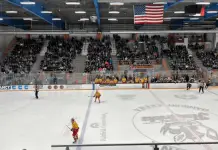A CHA proposal to use four-on-four during league overtimes will lead the agenda when the NCAA Rules Committee meets May 21-24 in New Orleans. An anticipated WCHA request to use video replay during the regular season will not materialize. The league opted not to pursue the change because different levels of replay would exist at the various league venues.
Although four-on-four overtimes have been popular in the NHL, there are some concerns about its implementation that the Rules Committee is expected to express.
“There are some questions about how you deal with penalties — carryover penalties such as if there’s a five-on-three at the end of regulation,” said Hockey East Commissioner and Rules Committee member Joe Bertagna.
“How are points going to be awarded? We’d like them to keep it as simple as
possible so that even though they’re changing the nature of the personnel it’s still a win or a loss, not one of these NHL-type things where both teams get [at least] a point [even if one loses in OT].
“We’d like to keep it as simple as possible because the results would also be part of the [NCAA tournament selection criteria].”
Had the WCHA video replay proposal reached the Rules Committee, it might have been stopped then for the same reasons the league itself chose to drop the idea, at least for the time being.
“Not everybody has the ability to make really good replay decisions,” said St. Cloud coach Craig Dahl. “In some buildings, you’d be making decisions off game tape. That wouldn’t really be able to show you whether a puck crossed the line or not.”
The CHA proposal (as would have been the WCHA’s) falls under the category of experimental rules, requested only for the league itself, such as Hockey’s East shootout experiment several years ago.
“You’re allowed, I believe, a two-year window to experiment,” said Hockey East Commissioner and Rules Committee member Joe Bertagna. “At the end of the two years, it either has to be dropped or adopted as a rule that everybody follows.”
Had video replay gone forward, it would have faced enormous obstacles in becoming a general NCAA rule within two years because of the difficulty of getting all nationwide venues to achieve some minimal technology standards. Presumably, it would have been, at best, accorded general acceptance only as an option in the rulebook.
No other significant rules proposals are expected.
Adam Wodon also contributed to this story.

